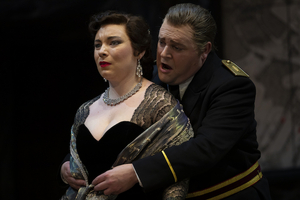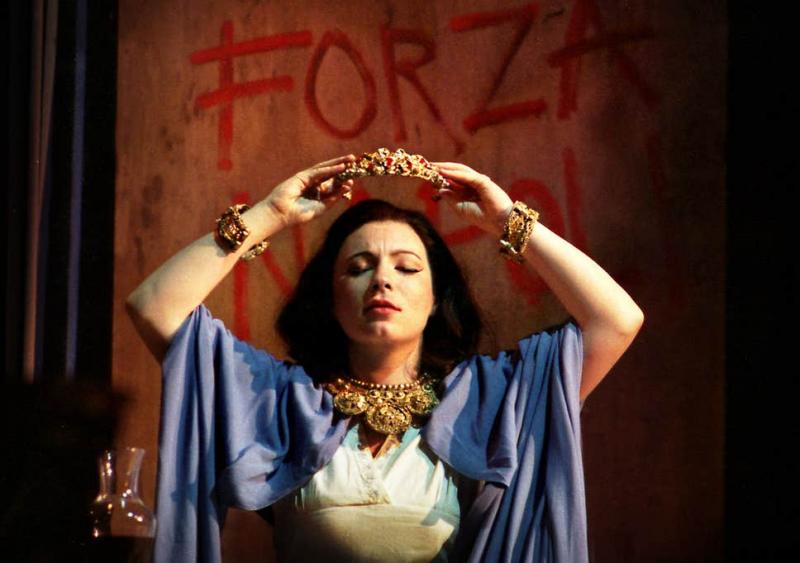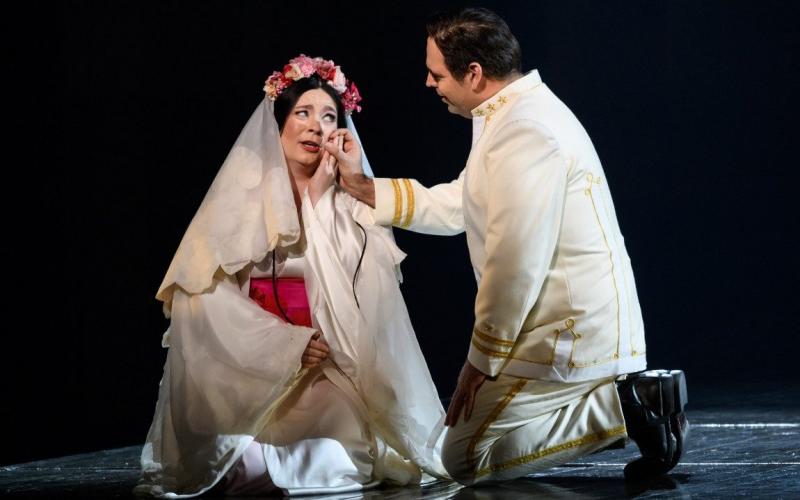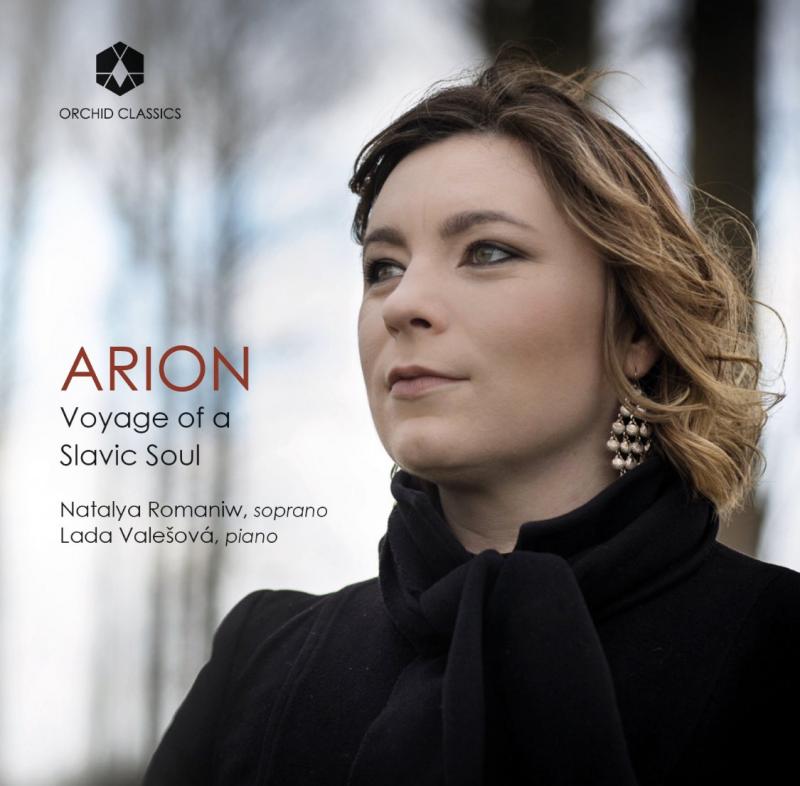Interview: Opera Singer Natalya Romaniw Discusses Her Career, New Album and Shutdown Plans

in Scottish Opera's Tosca, 2019
Natalya Romaniw has been called "the outstanding soprano her generation". Recent work includes the lead roles in Scottish Opera's Tosca and English National Opera's Madame Butterfly, plus making her BBC Proms debut singing Rachmaninov's The Bells with the BBC National Orchestra of Wales.
She talks to BroadwayWorld about her remarkable career, upcoming album Arion, and keeping the music going during the shutdown.
What was your first experience of opera?
It was actually later than you might expect. Before I went to the Guildhall School of Music and Drama (GSMD), I'd never actually seen an opera! My first one was the GSMD's production of Verdi's Falstaff and the first one I participated in was Stravinsky's The Rake's Progress for Welsh National Youth Opera. I remember thinking that this was truly the thing I wanted to do and I loved meeting others who felt similarly.
When did you decide to pursue singing professionally, and how did your family react?
Having not grown up in a musical family and therefore not really knowing much about the classical music world or the world of opera, I pursued my undergraduate degree at the Guildhall School of Music and Drama on the recommendation of my then singing teacher, Penny Ryan.
It soon became clear that I could really make a career in this art form, and after my postgraduate opera course and training at Houston Grand Opera Studio, I returned to the UK to make my first mark as Maliella in I Gioielli della Madonna (Wolf-Ferrari) for Opera Holland Park. My family were as supportive as they could be. and my mother has always encouraged me to follow my dreams, whatever they may be. The funny thing is that I didn't really ever realise what my dream was until I was living it.

Park's I Gioielli della Madonna, 2013
What were the most important things you learned at Guildhall?
I was very lucky to have great mentors at the Guildhall. I learned to always be sincere in my approach to music and most importantly to always be true to the text, be it song or opera. The most important and wonderful thing the Guildhall ever did for me was to open my eyes to the world of opera and give me the opportunities where I could grow and explore as a singer, under safe hands and good guidance.
What did you take from your time at Houston Opera, and is the American opera world very different to the UK's?
For me, Houston was a massive learning curve. It was a huge step from where I'd been cocooned in the Guildhall and I had to learn to take responsibility for myself, my own practice and essentially my own voice. I think the American system is very different to the UK's, from my personal experience. The Americans are great technicians and gear more towards technique primarily. I had a great teacher there who made me explore my breath more and therefore opened up my voice. But I never forgot about my artistic integrity and everything I'd learned in the UK.
You've tackled some phenomenal roles. Are there particular musical styles or characters you're more naturally drawn to, or do you enjoy doing a wide range?
I think I'm naturally drawn to the Slavic heroines in particular. My voice feels very at home singing them and I feel a deep connection to the music and the sentiment of those heroines. That being said, I love Puccini too and the latest role I sang was Madam Butterfly, which I really felt drawn to. For me, it feels very cathartic to emote through the character on the stage, and these particular heroines have a lot to give.
How do you find your way into a role like Butterfly and make it your own?
Butterfly is still a very new role, so I'm only at the beginning of exploring her. However, the first thing to do was to make sure I could sing it and not just in a coaching room, but also on stage, with the reality of emotions being high, having to physicalise her and having the mental endurance for a role of that length and size. It's very different to Tosca. Butterfly is constantly on the stage and you need to have nerve as well as a good technique in order to be able to sing and pace her.

in English National Opera's
Madam Butterfly, 2020
I think it's good in the rehearsal room to take emotions to their extremes and then bottle the thoughts for performance. It's important to draw on your own experience where you can, assuming it is relevant, but it's also imperative to be true to the score and the text, as well as Puccini's deliberate dynamic markings.
Critics often talk about the sheer power of your voice. When did you realise you had that unusual power, and was it difficult to harness?
My voice is a healthy size and may have been hard to align in my younger years, but I now feel very settled with it. I think it really does depend on the repertoire you sing. When I was younger, my voice wasn't quite harnessed as well as it could have been, as with most young singers trying to find their way. I tried a lot of repertoire and no one really knew what to do with me, which was frustrating at times. Now it's more obvious where I'm heading, and that only really came with patience, hard work and finding the right repertoire where my voice felt at home.
What are some of your proudest, pinch-yourself career moments so far?
I think this season I've been incredibly lucky to debut two of my dream roles one after the other for two of my most faithful and loyal companies: Tosca for Scottish Opera and Madam Butterfly for English National Opera. Both companies have been supremely supportive of my career, and it was a real honour to debut those two roles in rather spectacular and iconic productions too. They're up there with the pinch-myself moments!
I suppose Tosca is one of the roles every soprano builds up to, and I'd had it scheduled with Scottish Opera a long time ahead of my debut. It felt important to debut the role with a company that supported me throughout the early stages of my development, and I knew I would be in completely safe hands with the entire company, from backstage to the pit. Repetiteur Fiona MacSherry, Music Director Stuart Stratford, Head of Music Derek Clark and Head of Casting Sarah-Jane Davies have been huge supporters of mine from the get-go, and it was crucial to have that support and a nurtured environment for such an enormous, poignant debut for me here in the UK.
Scottish Opera's Tosca, 2019
How disciplined do you have to be when you're singing a mammoth role?
I think it's important to protect yourself when you're singing roles of a healthy size (it's always important to protect yourself singing any size role), but with the ones that require more stamina, you need to be well rested, hydrated and fed well. Those roles can be exhausting to rehearse every day, physically and emotionally, so it's in your best interest to take good care of yourself.
I don't adhere to any specific diets or any rituals, but I do find that good sleep and exercise helps me to be more alert and on form so that I can ultimately do my best. It's also important to surround yourself with good and supportive people and also to have fun.
Which other artists inspire you?
María Callas, Mirella Freni and Anna Netrebko.
Tell us a bit about your upcoming album - why did you decide to collaborate with pianist Lada Valešová, and is it particularly meaningful to get to honour your Slavic heritage?
My upcoming debut recital disc is called Arion and will be available to pre-order from 14 April. It is released on 1 May, and we are incredibly excited about it.
It is full of Russian and Czech song, accompanied by my wonderful friend and colleague Lada Valešová. Lada has taught me every single Slavic role and song I've ever known, and through those teachings, we have become dear friends to one another and have established a very natural connection and chemistry to this specific music. It felt only natural to record together and in this repertoire.
Likewise, are you proud to represent Wales and carry on that incredible musical tradition?
I am proud to be Welsh and always very happy to represent my country.
What are you up to during the shutdown? And how much of an impact does this have on freelance artists like yourself?
Shutdown has had a huge impact on our industry, and it is indeed a very sad and uncertain time for us all at every level.
Personally, I am carrying on learning everything as if it were still all going ahead. This gives me a sense of purpose and also means that whenever I am able to perform again, I'll have more repertoire under my belt. I'm taking this chance to seize the opportunity of being at home with time on my hands. That being said, it's challenging to be proactive when you don't know when you'll next see the stage. It can feel dispiriting at times, but all the more important to keep the music going.

upcoming album Arion
What are you listening to at home? Any good music recommendations?
I'm actually listening a lot to the Renée Fleming and Sir Charles Mackerras recording of Dvořák's Rusalka, which I'd highly recommend! I like to listen to things that allow me to escape the world for a moment.
Do you think there's enough support from e.g. the Arts Council, the Government, venues/companies...?
I think everyone is doing their best. These are extenuating circumstances and the pressure is stretched far and wide; organisations and companies are under a lot of financial strain. I know the Arts Council has been extremely helpful to companies and organisations such as Help Musicians, who have already been a key lifeline to musicians across the UK during this pandemic. Everyone there and indeed across the board of the UK opera companies are working their socks off in order to be able to support artists as best they can.
I just hope that the future of art will be reconsidered slightly. It is a vital and essential part of every life, and it should be treated with respect and integrity. I would like to see a more secure and stable position for all of us after this. It's time the arts were securely supported.
And how can opera fans support the industry during this difficult time?
I'm assured that the best thing opera fans can do is to please consider donating in any form they can to the companies and organisations that they believe in. Most companies thrive on ticket sales and particularly for the smaller companies that are not publicly funded, private funding. That means that we need your donations more than ever in order to keep our heads above the water. If you can help by not taking the refund from the ticket you've bought, or even just promising half of the ticket sale to a company, it'd help hugely. And, of course, keep tuning in - we're trying to keep music going on as many platforms as we can and we need our audiences!
What's on your bucket list of roles?
I'd love to sing the title role of Suor Angelica and one day (later on) Aida and Sieglinde.
Finally, can you share a funny story from your career to leave us on a cheery note? (I did hear tell of a horse, er, relieving itself onstage!)
Everyone loves the horse story! It was rather unfortunate that on the opening night of Eugene Onegin for Scottish Opera, our friendly stallion, George, felt the fear and first night nerves of having an audience and unfortunately he did relieve himself right in the spot where I later had to sing my letter scene (bare-footed) before the curtain could come down and they could clean it properly. However, he did look rather handsome in his entrance with Onegin.
Arion: Voyage of a Slavic Soul is released on 1 May by Orchid Classics - pre-order it here
Photo credits: James Glossop, Jane Hobson, Laurie Lewis
Comments

Videos

